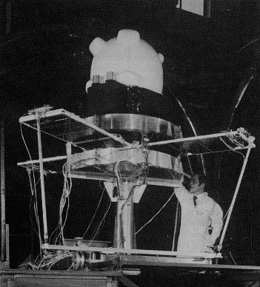Ariel 6

Ariel 6 before launch
|
|
| Mission type | Astronomy |
|---|---|
| Operator | SERC / NASA |
| COSPAR ID | 1979-047A |
| SATCAT no. | 11382 |
| Mission duration | 2 1⁄2 years |
| Spacecraft properties | |
| Manufacturer | Marconi |
| Launch mass | 154.5 kilograms (341 lb) |
| Start of mission | |
| Launch date | 2 June 1979, 23:26:00 UTC |
| Rocket | Scout D-1 S198C |
| Launch site | Wallops LA-3A |
| End of mission | |
| Deactivated | February 1982 |
| Decay date | 23 September 1990 |
| Orbital parameters | |
| Reference system | Geocentric |
| Regime | Low Earth |
| Eccentricity | 0.00328 |
| Perigee | 599 kilometres (372 mi) |
| Apogee | 653 kilometres (406 mi) |
| Inclination | 55 degrees |
| Period | 97.22 minutes |
| Epoch | 15 July 1979 |
Ariel 6, also known as Ariel VI and UK-6, was a British satellite launched in 1979 as part of the Ariel programme. It was operated by the Science Research Council, which became the Science and Engineering Research Council in 1981. Ariel 6 was used for astronomical research, and operated until February 1982. It was the last Ariel satellite to be launched.
The spacecraft was manufactured by the Marconi Company, and had a mass of 155 kilograms (342 lb). It carried three instruments; two of which were used for x-ray astronomy, and one which was used to detect cosmic rays. Interference from radar signals prevented the satellite from pointing correctly, and affected the data that it returned.
A Scout D-1 carrier rocket, serial number S198C, was used to launch Ariel 6 from Launch Area 3A at the Wallops Flight Center. The launch was successfully conducted at 23:26:00 UTC on 2 June 1979. The satellite was placed into a low Earth orbit, and received the International Designator 1979-047A.
Ariel 6 operated in a 599 by 653 kilometres (372 by 406 mi) low Earth orbit, at an inclination of 55 degrees and with an orbital period of 97.22 minutes as of 15 July 1979. It decayed from orbit and reentered the atmosphere on 23 September 1990.
...
Wikipedia
